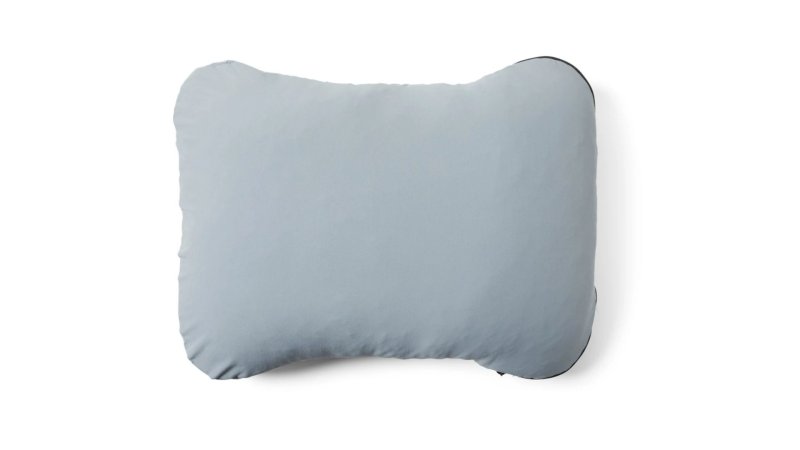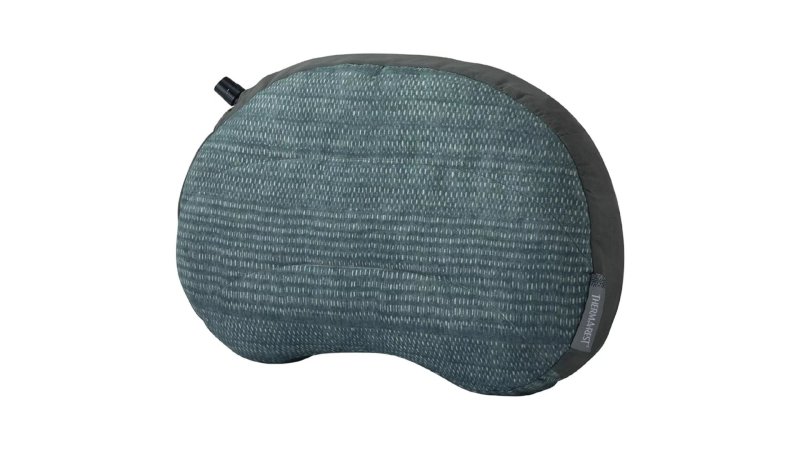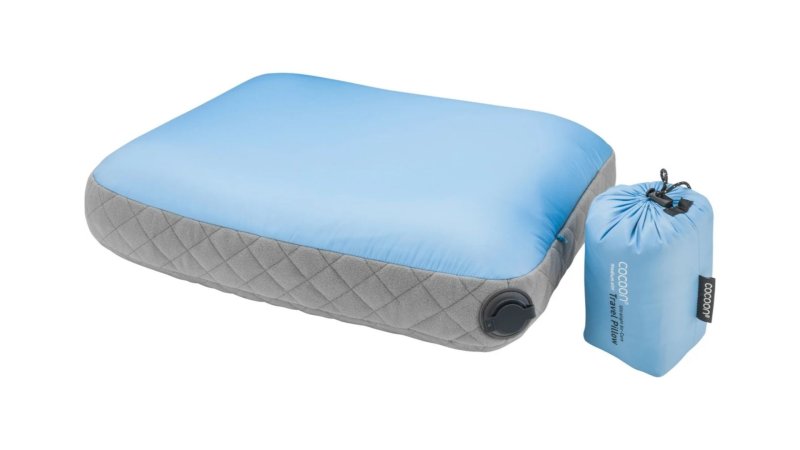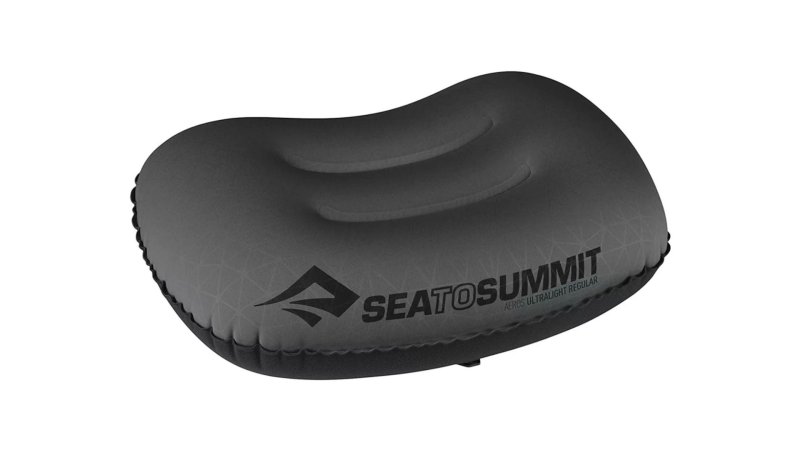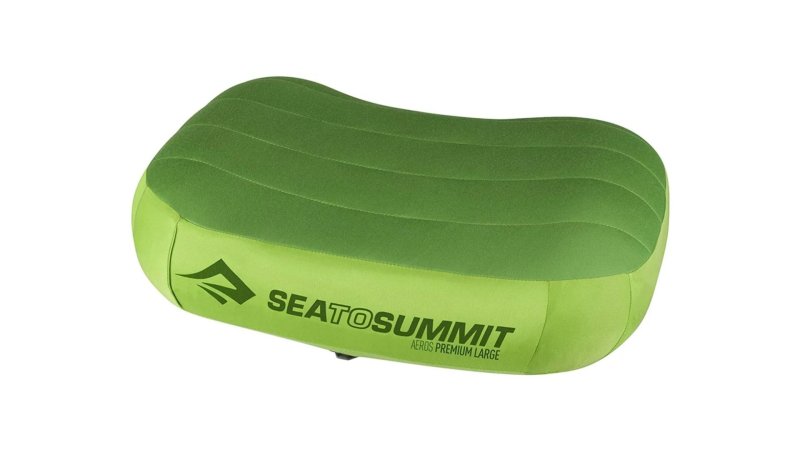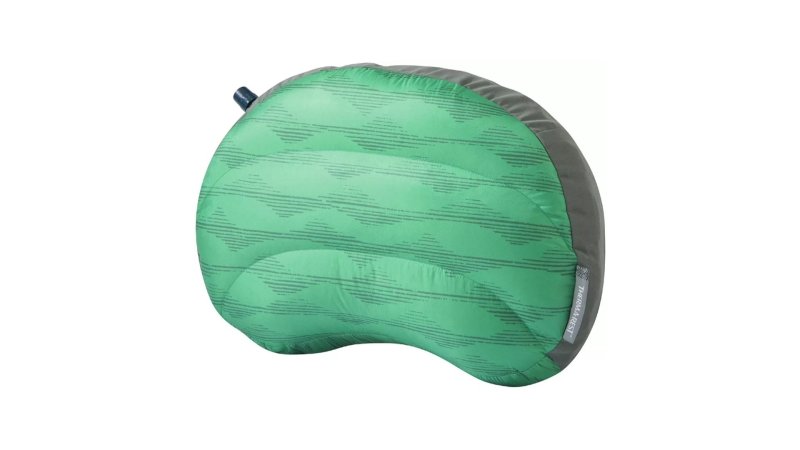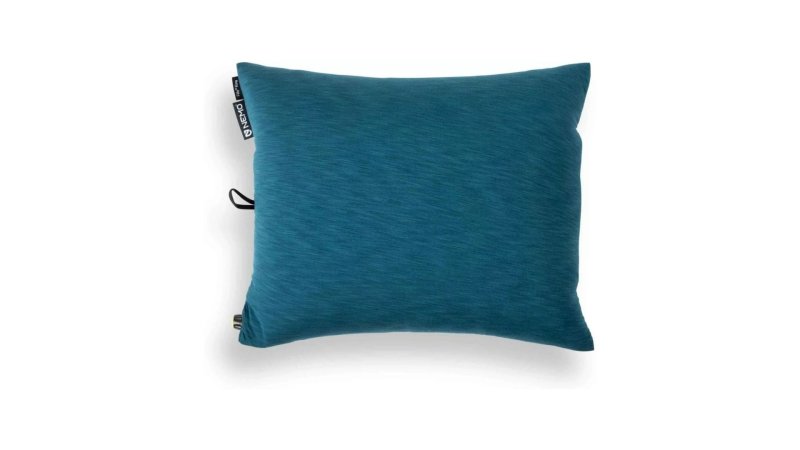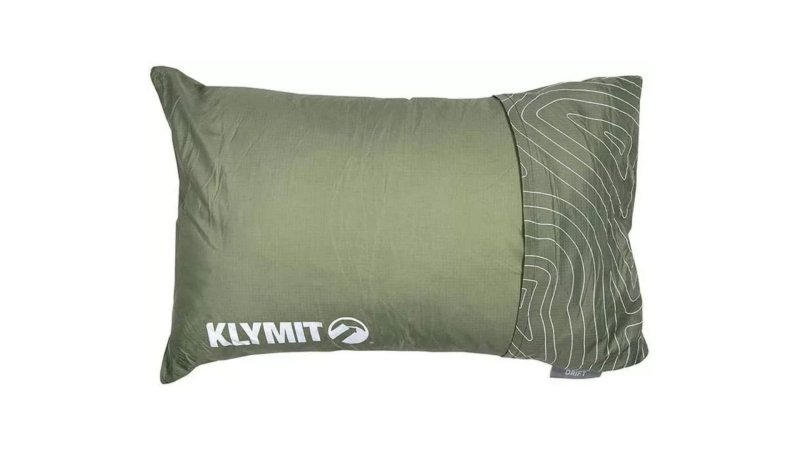

We may earn revenue from the products available on this page and participate in affiliate programs.
A camping pillow might be one of the most overlooked pieces of gear when camping or in the field. We tend to sacrifice comfort in the outdoors almost like it’s a badge of honor. Instead of laying your head on a rolled-up shirt or hiking boot, try a camping pillow.
However, finding the right camping pillow can be a challenge because it needs the right balance of comfort and packability. We unrolled our sleeping pads, threw on our night caps, and tested a range of camping pillows from ultralight to ultracush, so you can sleep better wherever travel takes you.
- Best Overall: HEST Pillow
- Best Value: Therm-a-Rest Air Head Pillow
- Honorable Mention: Cocoon Ultralight Air-Core Travel Pillow
- Best Ultralight: Sea to Summit Aeros Ultralight Pillow
Best Synthetic: Sea to Summit Aeros Premium Pillow - Best Down-Padded: Therm-a-Rest Air Head Down Pillow
- Best Hybrid: NEMO Fillo King Pillow
- Best for Side Sleepers: Klymit Drift Camp Pillow
Methodology
We selected camping pillows to test by seeing what’s offered by retailers like REI and Amazon, as well as reputable brands like Therm-a-Rest and Sea to Summit. We sought items with features like an inflatable chamber, high loft memory foam, down or synthetic padding, a removable/washable cover, a contoured shape so the pillow fits neatly inside a sleeping bag hood and keeps the pillow centered on your neck, and a protective stuff sack or travel case.
We also took into consideration pack size and weight. Taken as a whole, a camping pillow’s combined features will put it primarily in one of two categories: patrollers (backpackers) or FOB dwellers (car campers). If you’re a patroller hiking on foot, you’ll probably want something packable and lightweight. And, if you’re car camping, why settle for an ultralight, ultrasmall camp pillow when you can have cabin comfort?
For this review, we conducted two different tests with the camping pillows. First, we evaluated ease of use, travel, and storage. And, second, we tested them for comfort. In the first test, we inflated and deflated the pillows (the ones with an air chamber), scrunched and twisted them, stuffed them into their travel sacks, and packed them into a backpack and toughbox to assess travel size and space. And in the second, we evaluated how comfortable they were to sleep on and we judged them based on two separate rounds of sleep: one with a cot and one without a cot. In both tests, we used the pillow with a sleeping pad and a sleeping bag. In total, we evaluated overall size, packability (reduced size), weight, loft, support, comfort, ability to clean, and overall durability.
At Task & Purpose, we strive to find the best gear available for your needs. In this case, we’re writing about the best camping pillows to go along with our ongoing coverage of the best camping gear like tents, chairs, sleeping bags, and more. For more information on our review process, check out our editorial guidelines.
Best Overall
HEST Pillow
Pros
- Very comfortable high loft memory foam and polyester blended fill
- Great support for back and side sleepers
- Contoured profile keeps the pillow in place while you sleep
- Durable cover is removable, washable, and serves as a travel case
Cons
- Too large and heavy for backpacking or patrolling
- Does not fit in the hood of a sleeping bag
Product Specs
- Size: 22 x 15 x 8 inches
- Reduced size: 14 x 9 x 7 inches
- Weight: 2.2 pounds
Best Value
Therm-a-Rest Air Head Pillow
Pros
- Lightweight and packs down small
- Contoured shape designed to fit in a sleeping bag hood
- Soft brushed polyester cover is removable and washable
- Highly durable materials
Cons
- Only 4 inches of inflatable loft
- Small size not comfortable for long-term use
Product Specs
- Size: 11 x 15.5 x 4 inches
- Reduced size: 3.5 x 4 inches
- Weight: 5.6 ounces
Honorable Mention
Cocoon Ultralight Air-Core Travel Pillow
Pros
- Lightweight and small for backpacking pursuits
- Impressive synthetic fill comfort
- Removable, machine washable cover
- Baffle design cradles the head
Cons
- Not contoured to fit inside a sleeping bag hood
- Inflatable chamber material feels thin compared to others
Product Specs
- Size: 14 x 18 x 5.1 inches
- Reduced size: 5.1 x 3.9 inches
- Weight: 6.7 ounces
Best Ultralight
Sea to Summit Aeros Ultralight Pillow
Pros
- Ultralight and small pack size
- Inflate or deflate to customize support
- Contoured design fits in sleeping bag hood, and centers on shoulders and neck
Cons
- Cover is not removable for washing
- Not a long-term pillow solution
Product Specs
- Size: 14.2 x 10.2 x 4.7 inches
- Reduced size: 2.8 x 2 inches
- Weight: 2.1 ounces
Best Synthetic
Sea to Summit Aeros Premium Pillow
Pros
- Very light and small pack size
- Synthetic padding increases comfort
- Brushed 50D polyester surface is super soft and wicks moisture
- Contoured design fits in sleeping bag hood and centers on shoulders and neck
Cons
- Cover is not removable for washing
Product Specs
- Size: 11.8 x 16.5 x 5.1 inches
- Reduced size: 3.1 x 4.1 inches
- Weight: 4 ounces
Best Down-Padded
Therm-a-Rest Air Head Down Pillow
Pros
- Lightweight and packs down small
- Down padding in cover provides feathered comfort
- Contoured shape designed to fit in a sleeping bag hood
- Durable materials; cover is removable and washable
Cons
- Only 4 inches of inflatable loft
- Cover material feels slick and doesn’t wick as well
Product Specs
- Size: 11 x 15.5 x 4 inches
- Reduced size: 3.5 x 4 inches
- Weight: 4.9 ounces
Best Hybrid
NEMO Fillo King Pillow
Pros
- Hybrid foam and inflatable combination provides excellent comfort
- Up to 6-inch loft, customizable to individual needs
- Cover is removable and machine-washable
- Rolls into an integrated stuff sack
Cons
- A bit large for backpackers
Product Specs
- Size: 14 x 17 x 6 inches
- Reduced size: 12.5 x 4.5 inches
- Weight: 14 ounces
Best for Side Sleepers
Klymit Drift Camp Pillow
Pros
- Shredded memory foam and gel fiber core provides great comfort
- High loft and support is great for side sleepers
- Reversible cover; protective nylon outside, soft jersey inside
- Cover is removable and machine-washable
Cons
- Shredded memory foam felt through the cover
- Too large and heavy for backpacking
Product Specs
- Size: 16 x 23 x 6.5 inches
- Reduced size: Compresses to about half its size
- Weight: 28 ounces
Our verdict on camping pillows
There are many great options when purchasing a camping pillow, but choose one that’s appropriate for the camping you plan to do and one that aligns with your preferred sleep style. For car camping, your best bet is the ultracush HEST Pillow. And, for an infallible backpacking pillow, opt for the feature-packed Therm-a-Rest Air Head Pillow.
What to consider when buying a camping pillow
Don’t be overwhelmed by the seemingly endless options when searching for a camping pillow. In reality, there are three main categories to choose from: compressible, inflatable, and hybrid camping pillows.
Compressible pillows have a solid fill of down or synthetic material, and compress down to a smaller size. Inflatable pillows are the lightest and most packable option since most of the support comes from air. Hybrid pillows use a combination of solid fill materials and an inflatable chamber to achieve a balance of the best of the compressible and inflatable categories.
In addition to category, pillow features are also important to consider when selecting a camping pillow. The most important features include size, weight, loft, and durability. Size and weight determine the level of packability of camping pillows. Loft is a fancy way of discussing a camping pillow’s thickness and support. Durability is a key factor in choosing a camping pillow that can survive repeated use in dirty, rugged environments.
Types of pillows for camping
Compressible
A compressible pillow is ideal for car campers who don’t want to compromise comfort in the outdoors. Affectionately referred to as car camping pillows, these are the most comfortable category of camping pillows, but they come at the cost of also being the largest and heaviest. They get their high loft and superb cushion from a solid fill of memory foam, synthetic fill, or a combination of the two. And, because of their solid fill, expect these pillows to only compress down to roughly half their size. If looking for a pillow in this category, think about an ultra durable version of your most comfortable pillow at home. The HEST Pillow and Klymit Drift Camp Pillow perform superbly here.
Inflatable
Inflatable pillows are popular for backpackers who want comfort on the trail while accounting for every cubic inch and ounce of gear in their packs. The Therm-a-Rest Air Head Pillow and Cocoon Ultralight Air-Core Travel Pillow are top picks in this category.
At the core, an inflatable pillow is an air chamber inflated by breath and secured by a valve. Air chamber materials vary from a thick and durable polyurethane (commonly used by Therm-a-Rest), to other materials that are thinner and lower weight. Some may include baffles that help the pillow retain shape or create a pocket for your head.
But the real differences in inflatable pillows are seen and felt in the covers. These may be removable or adhered to the exterior of the air chamber. Options include brushed polyester, jersey, nylon, and more. Some inflatable pillow covers incorporate down or synthetic fill padding for extra comfort. Many inflatable pillows are designed with a contoured shape that works well in a sleeping bag hood.
Hybrid
Why not have the best of both worlds in a camping pillow? Hybrid pillows include an inflatable air chamber, while also incorporating a mix of foam and/or synthetic fill into the main chamber. In return, you get a pillow that has more cushion and support than a typical inflatable pillow, and is much lighter and packable than a solid-fill compressible pillow. The NEMO Fillo King Pillow was the best hybrid we tested. Hybrid pillows incorporate features and materials seen in both compressible and inflatable pillows, creating a category of pillow that can function for both car campers and backpackers.
Key features of a camping pillow
Size
How large of a pillow do you need when camping? Does your tent emulate a small cabin with every creature comfort from home? If so, you might opt for the largest camping pillow available. The Klymit Drift Camp Pillow was the largest we tested, and came in at 23 x 16 x 6.5 inches. That’s a bit smaller than a standard size regular pillow you might use at home, but still large enough to provide massive comfort while camping. The largest camping pillows, mostly in the compressible category, only compress or reduce to about half their size.
Many of our campers are backpackers who carry all of their gear with them on the trail and scrutinize every cubic inch of gear that goes into their pack. The camping pillows that pack down smallest tend to be inflatable pillows, with the Sea to Summit Aeros Ultralight Pillow registering at two x 2.8 inches.
Weight
Similar to size, the weight of a camping pillow is a key feature to consider depending on your type of camping. Car campers have less of a restriction on the weight of their pillows, so campers in this category often opt for compressible pillows packed with a foam or synthetic fill, and loaded with other comfort features. The heaviest pillow we tested was the HEST Pillow at 2.2 pounds.
On the opposite end of the spectrum, our backpackers compromise some comfort to lighten their load. Inflatable pillows are the standard when weight is a primary consideration. You only get a basic level of comfort for the two ounces that the Sea to Summit Aeros Ultralight Pillow weighs, but plenty of other inflatables are substantially more comfortable for only a few ounces more.
Loft
How much loft do you need to sleep comfortably? Camping pillows range from about three to 6.5 inches of loft. Within this range, inflatable pillows typically register at three to five inches of loft, while compressible pillows roughly five to 6.5 inches of loft.
It’s important to note that users can customize the level of loft on many camping pillows by removing some of the fill from compressible pillows (check for zippered access to the fill compartment), or letting some air out of the inflatable pillow. Compressible pillows with too much fill or inflatable pillows that are overinflated can be more uncomfortable than not having a pillow at all.
Durability
If you’re going to invest in a camping pillow, you want to know it’s going to perform consistently when camping and be able to take some abuse that comes with being outdoors. This is a key feature of camping pillows that sets them apart from regular pillows.
For compressible pillows, having a travel case or cover made of rugged material is important. From being stuffed into tough boxes with other gear, to being dropped in the dirt, camping pillows need protection and durability built in. Also look for a removable and machine-washable cover that will keep your pillow fresh and clean every time you head out on a trip.
When it comes to inflatable pillows, the most durable are those with polyurethane chambers like those made by Therm-a-Rest. You want a pillow that can be inflated and deflated hundreds, if not thousands, of times with no punctures or tears. Also look for a removable, machine-washable cover to keep the sleeping surface fresh and clean.
Pricing for camping pillows
Prices for camping pillows can range from $20 for a basic inflatable or compressible pillow to upwards of $85 for high-end models packed with comfort and features. You’ll find options of inflatable and compressible pillows that run the entire pricing range from bottom to top, while hybrid camping pillows begin in the middle of the range and increase from there.
On the lower end of the pricing range, you can expect a basic level of comfort that will keep your head off the ground and provide a soft surface to lay on. The further up the pricing range you go, you can expect an increase in comfort, better materials, more durability, and more.
Ultimately, pillows are a very personal piece of gear, so how much you choose to spend on a camping pillow will likely depend on how seriously you take your sleep and camping comfort.
Tips and tricks
As with something you do for decades upon decades, you pick up a few tips and tricks along the way in terms of selecting the right product, and/or using it. That’s the case with us and camping pillows. To help you bridge the information gap, here’s a selection of what we’ve learned along the way.
- For inflatable camping pillows, don’t inflate all the way or it will feel like you’re sleeping on a rock. The comfort zone is usually around half to three quarters full of air.
- If you don’t want to dirty the cover of your camping pillow, bring an old pillowcase from home or cover it with a clean t-shirt you have in your pack.
- Leave the valve all the way open when storing inflatable pillows, so any moisture inside can escape and help prevent mildew.
- Store foam and synthetic fill pillows in their open position and not folded or compressed. Long-term compression reduces loft, support, and comfort.
FAQs about camping pillows
You’ve got questions. Task & Purpose has answers.
A: You can use regular pillows for camping, and some people do. The problem is regular pillows are not designed to be used in an outdoor environment and are much more prone to soiling, staining, and ruin. They also are not very packable for backpackers.
A: It depends on the camping pillow. Some have removable covers that are machine-washable. Some must be hand-washed and air-dried. It’s always best to check the manufacturer’s instructions to be sure.
A: Many camping pillows have a contoured design that allows them to be used inside a sleeping bag hood, and keeps the pillow centered over the shoulders and neck. Some manufacturers may include non-slip fabric to prevent pillows from sliding.
A: Absolutely. Many camping pillows provide remarkable support and comfort using materials designed to survive the use and abuse of camping outdoors.
